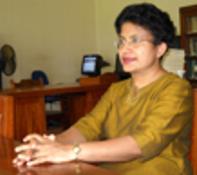A Silent Revolution? ‘Free Education’ And Sri Lankan Women

By Carmen Wickramagamage -
It is no exaggeration to say that one of the social groups that has most benefited from the revolutionary education reforms implemented starting 1947 [which most of us know as either Free Education or Kannangara Reforms] is Women. In 1946, when the overall literacy rate for the country was 57.8%, only 43.8% of the female population was literate as opposed to
70.1% of the male population (Panditaratne and Selvanayagam, 1973). By 2001, however, the percentage of literate women had gone up to 90% of the female population in comparison with 93% for the male population. Among Lankan youth between the ages of 15-24, it is even higher at 97% literate females to 99% literate males, according to UNICEF Sri Lanka statistics for the 2005-10 period.
 This poses an interesting question: How did the gap between the percentages of literate men and women come to be narrowed so rapidly and significantly during the intervening 60-odd year period? What was the equivalent of the “open sesame” that opened the closed doors of formal school-based education for Lankan women in the post-independence period? The simple answer: “Free Education.” While the Kannangara reforms did not introduce “free education” to Ceylon/Sri Lanka, they (i) abolished the earlier two-tiered education system very much pegged to class where fee-levying “English Medium” schools catered to the local elite and a system of “free” Vernacular Schools catered to the masses; (ii) introduced Swabhasha [or First Language] Education into the school system starting 1947, where it was made compulsory for students to be educated in their “mother tongue.” It was these two reforms that have enabled Education to function as an instrument of social justice in Sri Lanka, freeing individuals from the debilitating impacts of ascribed social status such as caste, class and gender and instituting a meritocracy of sorts in Sri Lanka, however imperfect it might be, where the deserving individual can move up the social and economic ladder on the basis of merit irrespective of his/her “origins.”
This poses an interesting question: How did the gap between the percentages of literate men and women come to be narrowed so rapidly and significantly during the intervening 60-odd year period? What was the equivalent of the “open sesame” that opened the closed doors of formal school-based education for Lankan women in the post-independence period? The simple answer: “Free Education.” While the Kannangara reforms did not introduce “free education” to Ceylon/Sri Lanka, they (i) abolished the earlier two-tiered education system very much pegged to class where fee-levying “English Medium” schools catered to the local elite and a system of “free” Vernacular Schools catered to the masses; (ii) introduced Swabhasha [or First Language] Education into the school system starting 1947, where it was made compulsory for students to be educated in their “mother tongue.” It was these two reforms that have enabled Education to function as an instrument of social justice in Sri Lanka, freeing individuals from the debilitating impacts of ascribed social status such as caste, class and gender and instituting a meritocracy of sorts in Sri Lanka, however imperfect it might be, where the deserving individual can move up the social and economic ladder on the basis of merit irrespective of his/her “origins.”
The writer teaches English at the University of Peradeniya.


